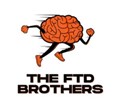Story
This September was World Alzheimer's Month, and we teamed up with the FTD Brothers and supporters as they Run For A Cure. We still have a few more races that we have committed to before the year is out! Please help us to help them by sponsoring if you can..
Jordan, Cian and their family have become good friends of ours and we feel very strongly in helping them find a cure.
Please read their story below - they are just short of 300k - if you are able to donate every penny will make a difference - Thank you for reading
We are Jordan and Cian Adams, 2 of 3 siblings who grew up in the small town of Redditch, Worcestershire with our Mom ‘Geraldine’, Dad ‘Glenn’ and elder sister ‘Kennedy’.
Growing up we had a great childhood, and both of our parents provided us with a great start in life. Mom was particularly obsessed with big occasions; she was the life and soul of the party. Always making sure our day was extra special whether it be a birthday or Christmas as well as enjoying celebrations with close friends on a regular basis. She was a loving, generous and vivacious character who adored spending time with family and friends. She was very proud of her Irish background and would frequently put on the accent when socializing with friends or telling stories from her own childhood. She was the type of lady who you could not help but notice when she walked into a room, ready to talk to absolutely anybody and light up your day with her beautiful smile.
So, when you have such a big character like that as one of your parents, it doesn’t take long to notice subtle but significant changes in their character or behaviour. and when we noticed mom becoming less and less outgoing , her mood lowering as well as numerous lapses in her memory we knew something wasn’t quite right and as time wore on moms ‘symptoms’ worsened. It was in this period when our dad chose to seek help medical help get to the root of what was causing these changes to our mom.
After months of back and forth with different GPs and consultants, an incorrect diagnoses of depression and different mental health issues including a silent stroke. Our mom was eventually told that she had ‘Early-Onset’ Frontotemporal Dementia (FTD) on the 23rd June 2010 and it was later that evening that our Dad had to break the news to us that Mom was terminally ill and that her health was going to deteriorate over a 6–10-year period. As that was an incredibly tough responsibility for my dad, we never blamed him for not telling us in the same conversation that it was hereditary and that we all had a 50% chance of inheriting the same FTD when we reached moms age.
At the time of mom's diagnosis Kennedy was 17, Jordan 15 and Cian was just 9 years of age and in the months and years that followed we all had to care for mom as her condition deteriorated, this included stopping mom from driving the car when she had her license revoked but could not remember or making sure she didn’t wonder out of the house on a walk and become confused as to where she was. Eventually leading to us helping to feed mom when she became permanently bed bound and helping to take her to the bathroom when she could no longer walk or talk. These are all duties of care which no child should have to do for a parent but when it is someone that you love, you have no choice. Sadly, on 14th March 2016 at the age of 52 my mom passed away peacefully at our family home.
It was only following my moms passing that Kennedy had lit up a burning desire to know whether she would inherit exactly what we had watched happen to our mom over the past 6 years. So, after reaching out to my Mom’s cousin Mary, Kennedy arranged a visit to Dublin Neurological Institute to see Professor Tim Lynch, the man who had researched and explored the familial FTD in our family through the case study of one of my mom's cousins, a 44-year-old Irish farmer as detailed in the article below in the Irish Times.
Alzheimer’s Research UK is the UK’s leading dementia research charity. They're striving for a cure, by revolutionising the way they treat, diagnose and prevent dementia.
.
